JKU LIT
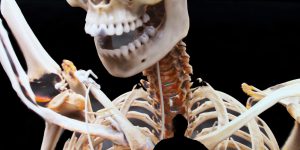
Virtual Anatomy – Preview of the JKU MedSPACE
Interactive multisensory environment, 2020
The Johannes Kepler University Linz (JKU) is currently constructing a modern, future-oriented multi-purpose learning space at the JKU Faculty of Medicine’s new medical education and research building. Scheduled to open in 2021, the space will not only be used as a virtual lecture hall for anatomy courses, but will also provide live surgery broadcasts from operating rooms to improve student education and post-graduate educational courses.

STEAM Popup Lab
JKU Linz School of Education (AT)
STEAM Popup Lab is a virtual journey to understand the meaning of patterns all around us. Patterns are everywhere, from fractals in nature to blood vessels in the human body, through the oscillating signals produced by the sensors of a phone. You can control robots, fold origami patterns, measure the signal of a playground swing, be part of a live chemistry lab session, and more.
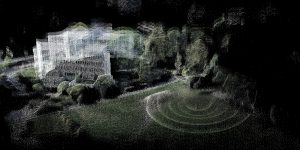
site-inflexion
Fulldome / VR & AR Lab
The immersive installation site-inflexion invites visitors to take part in a site-specific virtual and acoustic journey. The scenery and soundscapes of the JKU campus are the main actors in the work, alluding to Johannes Kepler's activity as a landscape mathematician. A laser-scanned topographic survey of Kepler’s gardens becomes an audio-visual environment transfigured by the everyday sounds that inhabit them. Oscillating between urban pollution and phantasmagoria, structures and lawns bend and curve under the effect of sound waves, reaching their inflection point by tipping towards the unknown.
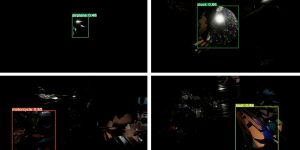
Cross Perception - work in progress
Fulldome / VR & AR Lab
A limitless space. Everything moves—light, shapes and colors. Human and machine let their sight wander and try to recognize something. The human beings search for orientation, the device calculates.
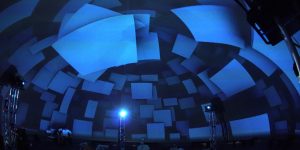
Future Room and Liminal Spaces (re-edited) 360˚ film screening
Fulldome / VR & AR Lab
The Fulldome Program of the Digital Arts Department at the University of Applied Arts Vienna presents experimental immersive works, collaborations between the Department and the University’s Science Visualization Lab, Trans-Media Academie Hellerau, and the transdisciplinary performance company, kondition pluriel. Future Room and Liminal Spaces (re-edited) reveal the artistic potential of the fulldome, as does the 360˚ film screening selection of works by researchers, teachers, and students.
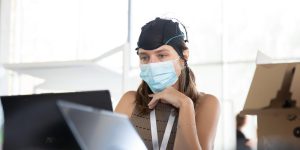
BR41N.IO Hackathon - The Brain-Computer Interface Designers Hackathon
The BR41N.IO Hackathon brings together programmers, engineers, designers, artists and/or enthusiasts, who collaborate intensively as an interdisciplinary team. Each team must design and build a unique, playful and wearable headpiece that can measure useful EEG signals in real-time to create any sort of interaction. The hacking projects use EEG electrodes and amplifiers, and challenge programmers to code an interface that enables them to control devices, robots or applications, post messages on social media, make paintings, or enact a myriad of other applications only with their thoughts. BR41N.IO also challenges creative minds to design a BCI headset with 3D printers, handcrafted materials and sewing machines.
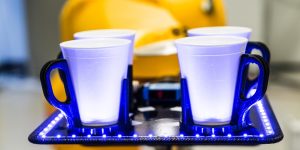
Robots in Action - fast and sensitive!
Institute of Robotics, Johannes Kepler University Linz (AT)
Robots can be strong and sensitive at the same time! They can move extremely fast but also handle fragile objects like champagne glasses. Imagine you want to carry a tray with several glasses of filled liquid without spilling –and you may even be adventurous and try to wave the tray over your head. Most of us will fail to perform such a stunt without breaking some glasses, but our robots are smart and agile enough to do just this. The Institute of Robotics at Johannes Kepler University will open its lab and showcase what modern industrial robotics are, and how fun they can be.
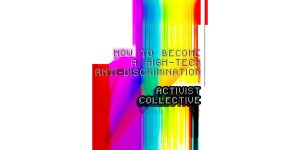
Nushin Isabelle Yazdani und Internet Teapot (Karla Zavala und Adriaan Odendaal): [d/r]econstructing AI - dreams of visionary fiction and zine-making
How to Become a High-Tech-Anti-Discrimination Activist Collective
With this workshop we investigate the structures behind algorithmic decision making systems, discuss why their design is normative, and how AI systems reinforce structural discrimination. We embark on a speculative journey and discuss how to design to create a more just world. Which artists inspire us? Which values are important to us? We want to collect our thoughts and creative outputs in a zine.

LAB ON STAGE (Adriana Torres Topaga, Martyna Lorenc and Andrea Maria Handler): Phantom Data in our bodies and imagination
How to Become a High-Tech-Anti-Discrimination Activist Collective
This workshop undertakes a performing arts’ approach. Our departure is the embodiment of imagination and perceptual processes. With somatic exercises and performative games, we notice the data flowing in from our bodies: sensation, image, emotion or memory. Imagination has its own training dataset - therefore a specific priming/bias/imprint. We look for practices of becoming aware of HOW we imagine things and what escapes our field of attention.

Astrid Mager und Hong Phuc Dang: How to create your own AI device with SUSI.AI - An Open Source Platform for Conversational Web
How to Become a High-Tech Anti-Discrimination Activist Collective
The workshop introduces SUSI components like SUSI’s technology stack, its wiki-like skill editor and hardware prototype; participants work together to create a simple bot, develop new skills and test them. A reflection on data bias and algorithmic discrimination invites to collectively think about creating non-discriminatory digital technologies.

Doris Allhutter: “When I encountered discriminating IT-systems and did not want to take it anymore” - deconstructing affective entanglements in society-technology relations
How to Become a High-Tech Anti-Discrimination Activist Collective
This workshop uses the deconstructive method of mind scripting to understand the grip that even technologies that we reject may have on us. Using our own memories as an experimental resource we will explore how discrimination and privilege materialize in our practices. This aims at developing collective agency and activisms.

Safiya Umoja Noble: Algorithms of Oppression - How Search Engines Reinforce Racism
How to Become a High-Tech Anti-Discrimination Activist Collective
The landscape of information is rapidly shifting as new demands are increasing investment in digital technologies. Yet, critical scholars continue to demonstrate how many technologies are shaped by and infused with values that are not impartial, disembodied, or lacking positionality. Technologies hold racial, gender, and class politics. In this talk, Dr. Safiya Noble will discuss her recent book, Algorithms of Oppression, and the impact of technology on the public.

Lisa Nakamura: Estranging Digital Racial Terrorism After COVID
How to Become a High-Tech Anti-Discrimination Activist Collective
This talk argues that COVID-19 forced an accelerated migration to digital networks that exposed new audiences to traumatically racist digital events as well as new openings for critique and resistance.

How to Become a High-Tech Anti-Discrimination Activist Collective
IFG-LIT (AT)
New technologies have penetrated all aspects of our lives and promise a wide range of improvements and efficiencies. Contrary to general perception, though, the algorithms on which these technologies are based are neither neutral nor do they treat everyone equally.

Magic Darts or, when every throw is a perfect hit
Andreas Stelzer (AT), Rudolf Scheidl (AT)
Darts is a popular game, but difficult to master. In this version of darts, players always hit the bullseye. What looks like witchcraft is revealed as a mechatronic system, with a novel microwave sensor network and ultrafast hydraulic actors interacting. Such technologies will affect our future daily life, e.g. in self driving cars, with microwaves allowin us to see in the dark, with fog or dust; or in exoskeletons, where hydraulic actuation enables ultimate compactness.
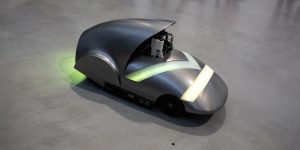
K – JKU’s Interactive Robocar
Institute for Machine Learning, LIT AI Lab, LIT Robopsychology Lab, Johannes Kepler University (AT); Inseq Design (AT)
K is a likeable little robocar: small in size, but very smart on board! Named after JKU’s famous patron, Johannes Kepler, it drives itself autonomously on changing terrain, can predict the movement patterns of pedestrians and playfully interacts with its environment.
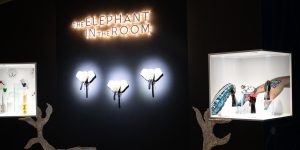
The Elephant in the Room
Melanie Baumgartner (AT), Florian Hartmann (AT), David Preninger (AT)
Nature-inspired robotics is collaborative, adaptable and ecological. With biodegradable and edible materials, new technologies that interact sustainably with humans and nature emerge. Imitations of an elephant's trunk embody such soft nature-inspired robots and interact quite naturally with visitors in Kepler's Gardens.
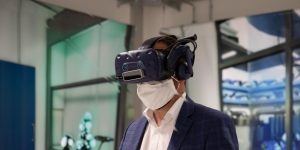
Robots Talking To Me
LIT Robopsychology Lab, Johannes Kepler University (AT)
How should robots communicate with people? What voice makes AI assistants sound trustworthy? Do we even have to listen to robots or should we always be in command ourselves? Under the title *Robots Talking to Me*, the *LIT Robopsychology Lab* presents four installations that give tangible expression to questions of human-machine relationships and invite participation.
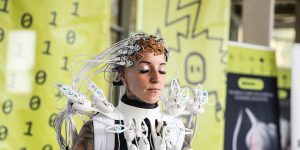
The Pangolin Scales
Thomas Faseth (AT), Harald Pretl (AT), Christoph Guger (AT), Anouk Wipprecht (NL)
The Pangolin Scales demonstrates the world’s first 1.024 channel brain-computer interface (BCI), which is able to extract information from the human brain with an unprecedented resolution to control an interactive, fashionable dress.
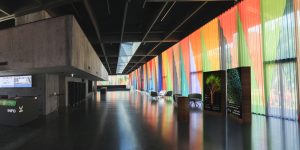
Treeversity
Johann Höller (AT), Thomas Lorenz (AT), Florian Gruber (AT), Ursula Niederländer (AT), Tanja Illetits-Motta (AT), Raphael Blasi (AT), Andreas Rösch (IT), Stefan Küll (AT)
Treeversity focuses on the relation between Big Data and data visualization to convey complex information at a glance. A mirror of the university’s inner workings, diligently recording success, failure and evolution. A portrait of its life in the form of a tree. Courses, grades and exams become branches, creating many different trees. Fully grown or nascent, withering or growing erratically. Treeversity shows the university as a forest, providing a tool to analyze its mechanisms at the same time.


